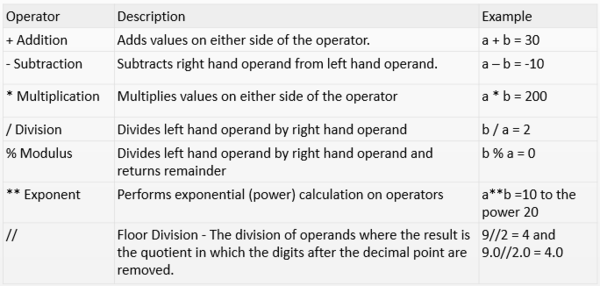Difference between revisions of "Variables - Python"
(→Extension Tasks) |
(→Now Try) |
||
| Line 38: | Line 38: | ||
=Now Try= | =Now Try= | ||
| − | '''1)''' | + | '''1)''' You run a gardening business, your main work is mowing customers lawns. Create a program to calculate the cost if: |
| + | * The lawn is 8 metres by 12 metres | ||
| + | * You charge £1.75 per square metre | ||
| + | * To pay for the up keep of your tools you add 5% to every job | ||
| − | + | '''2)''' If a pay as you go mobile phone charges: | |
| − | + | * 10p per text message | |
| − | + | * 35p per minute for voice calls | |
| − | + | * 15p per MegaByte of data | |
| − | + | How much will it cost if you made: | |
| − | + | * made 150 minutes of voice calls | |
| − | + | * sent 250 text messages | |
| − | + | * used 200 MegaBytes of data | |
| − | |||
| − | |||
| − | |||
| − | |||
| − | |||
| − | |||
| − | |||
| − | |||
| − | |||
| − | |||
| − | |||
| − | |||
| − | |||
| − | |||
==Extension Tasks== | ==Extension Tasks== | ||
Latest revision as of 11:39, 4 March 2019
What is a Variable
A variable can be used to store a value within your program. Most languages require you to declare a variable and then assign a value to it, however python does not.
In most languages, a variable is of a specific data type and this can't change during the program. However python will determine the data type to use from the data stored in the variable.
Variables in Python
You need to give a name for the variable and then assign it a value:
counter = 100 # An integer assignment
miles = 1000.0 # A floating point
name = "John" # A string
You could print the current values for each variable:
counter = 100 # An integer assignment
miles = 1000.0 # A floating point
name = "John" # A string
print("counter value is " + counter)
print("miles value is " + miles)
print("name value is " + name)
You can perform calculations with variables:
counter = 100 # An integer assignment
miles = 1000.0 # A floating point
name = "John" # A string
counter = counter -1
miles = 1000 * 5
test = miles / 2
The arithmetic operators in python are:
Now Try
1) You run a gardening business, your main work is mowing customers lawns. Create a program to calculate the cost if:
- The lawn is 8 metres by 12 metres
- You charge £1.75 per square metre
- To pay for the up keep of your tools you add 5% to every job
2) If a pay as you go mobile phone charges:
- 10p per text message
- 35p per minute for voice calls
- 15p per MegaByte of data
How much will it cost if you made:
- made 150 minutes of voice calls
- sent 250 text messages
- used 200 MegaBytes of data
Extension Tasks
- Create a program to calculate the area of a circle
- Create a program to calculate the volume of a cylinder
- Create a program to use Pythagoras theorem
